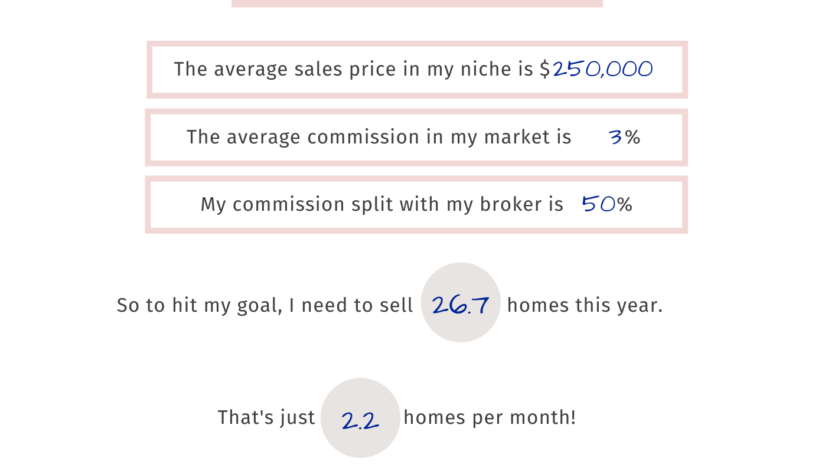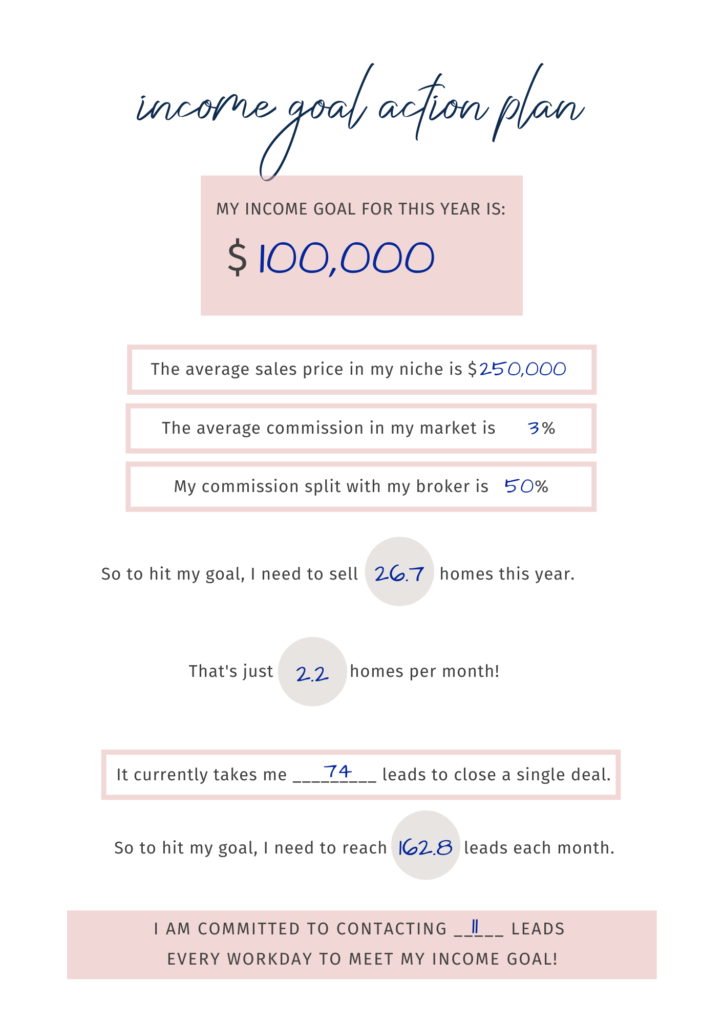Welcome to 2020, your year to transform your business with fresh, new real estate business ideas.
To kick off the year right, we’re giving you 20 real estate business ideas for 2020. Some are simply business-changing principles you can implement at any time, but many are specific to the changing market conditions many markets are beginning to experience.
Whether you’re brand new or seasoned, small-time or top-producer, these 20 real estate business ideas will help you move the needle over the coming year!
20 Smart Real Estate Business Ideas for 2020

20. Set Your Goals and Post Them Front and Center
We’re starting with a soft-ball business idea: set clear goals, document them, and post them where you will be reminded of them every day.
Because, let’s be real, it’s easy to say you’re going to “sell more homes this year”. But that’s probably not going to happen unless you 1) be specific about how many homes and how you’ll manage that number, 2) document your goal, and 3) continually remind yourself of that goal. How many times have you simply forgotten about your goals in all the hustle of daily work?
It’s not too late to set your S.M.A.R.T. Goals for 2020!
19. Learn More!
Ok, this one might be more for seasoned agents than for newbies. As a newbie, you already have a lot to learn, so you’re probably already learning at a break-neck pace.
But as you grow your business, you naturally start to think you know exactly what you’re doing, because, for the most part, you do! The problem is…you might be missing big opportunities by not continuing your real estate sales training. Things change. There are new marketing methods available to you, new client expectations, new financing options! Lots of new ways to land new business.
You don’t need an expensive seminar or a full course. Simply pick up a new book or check out a new podcast!
18. Master Your Scripts
Some agents love scripts, some agents hate them. But can we all agree that using scripts (even when you edit the heck out of them to make them more “you”) gives you the confidence to answer client questions in a way you know will resonate with them?
Scripts are a powerful tool. Once you have your scripts, you can practice, practice, practice them until you can deliver them in your sleep. Contrary to the opinion of some, mastering scripts to this degree actually frees your mind so you can be more present with your clients. Instead of fumbling for words, you can focus on your clients’ reactions to uncover their real concerns and address them.
PS: Make sure your scripts are up-to-date if your market conditions are slipping into correction/recession territory.
17. Get Clear on Your Clients
As a real estate writer, I write a lot of agent bios. And one question I always ask is “what is your specialty niche?” Interestingly, about 90% of agents respond “residential”. Residential is not a specialty. Residential casts an enormous net and forces you to compete with literally every other agent in your market.
A better bet is to niche down. Focus on a smaller group so you become the go-to agent for that demographic. For example, if you have an abundance of compassion, you might be well-suited to help people sell their family home once the patriarch/matriarch passes away. Or maybe you’re all about cold hard numbers and networking, in which case you’d be a good fit for real estate investors.
Take a few minutes this year to sit down and clearly define your niche clients. What are their needs? Fears? Goals? And how can you best serve them?
16. Reach Out for REOs
Economists are predicting the next recession to begin sometime in 2020 or 2021. And while it doesn’t look to be as severe as the Great Recession, there will likely be an increase in foreclosures and bank-owned (REO) opportunities. So start laying foundations now if you plan to work the REO circuit during the upcoming recession.
The best place to begin is by building relationships with asset managers at local banks. They are the people responsible for re-selling foreclosed properties. They are the people who get to choose the real estate agents to handle these listings. Invite the AMs to lunch. Provide them with helpful market updates. Make yourself useful to them.
The agents will come out of the woodwork to work with asset managers once the market dips, so make sure you have a solid relationship established before then. Early-to-mid 2020 is the perfect time to start!
15. Give Your Website a Face Lift
It’s 2020. If you don’t have a website of your own yet, this is the year you need one. Your broker’s site doesn’t count. Your broker’s site promotes your broker, not you. Having your own website gives you:
- the freedom to represent your own brand
- the ability to generate passive leads from Google searches
- credibility; younger buyers and sellers won’t take you seriously if you don’t have your own online presence
- a chance to demonstrate your knowledge and expertise
- the power to engage your prospective clients before they ever contact you
Your website doesn’t need to be expensive or complicated. Check out How to Build a Real Estate Website for completely free step-by-step instructions on building your own website. It’s easier than you might expect, and DYI-ing your site will save you thousands of dollars!
14. Start Thinking About Your Real Estate Investments
You know real estate is a killer investment; you explain that fact to buyers every day! But how much real estate investing are you doing yourself? You probably own your home. Anything else?
Naturally, the biggest hurdle to traditional real estate investments is cash. Especially if you’re in a high-value market like New York or LA. But there are so many other ways to invest in real estate! Ways that require much less money upfront. Don’t believe me? Check out 18 Different Ways to Invest in Real Estate! Then draft your plan for your next real estate investment.
13. Update Your Bio (and Maybe Your Photo!)
Real estate bios are difficult to write. I know. I’m a professional real estate writer and I write professional bios constantly!
But they’re also critically important. Your bio might be your prospective client’s first introduction to you and your business. It needs to engage them and convince them that you are the best agent for them. Your bio is worth some serious thought and time. Not sure where to start? Check out How to Write a Killer Real Estate Agent Bio. This post will show you the exact method I use to create bios that generate leads.
Oh, and if your headshot is older than 5 years, it’s time for a photo update in 2020 as well!
12. Establish Your Brand
So we already covered getting clear on your clients. You need to niche down to have an impact in a competitive market. And part of the reason you need a niche is so you can brand yourself in a way that resonates with your chosen niche.
What do your colors, fonts, and messaging say about you and your business (or do they just promote your broker?).
2020 is the year you take control of your brand and cement your place in your market. It takes a little time to work out your branding, starting with your clients’ needs, expectations, goals, etc, and crafting a design and vision to perfectly suit yourself and your clients. But it’s worth the investment.
If you’re not sure where to start, consider investing in an inexpensive digital workbook that will walk you through the process quickly and easily!
11. Build a Better Financial Plan
Be honest: is your financial plan about treading water until your next commission check? Living on an inconsistent income is tough! Much harder than most people expect when they enter the industry. So you need a financial plan that works with your unique pay schedule.
In How to Create a Bullet-Proof Financial Plan, I’ll show you how to create a financial plan that works for you. Something that allows you to cover all your necessities (including business expenses like marketing!), while still saving for retirement and somehow still setting aside money in your Dream Fund (you know, so you can travel the world, launch a non-profit, send your kids to college, whatever your dreams may be).
10. Leverage Your Listings
Buyers are great, but listings are gold!
You can leverage any listing into 5 new clients, so if you’ve primarily been a buyer’s agent, it’s time to consider a shift in 2020. You can still work with buyers. In fact, some of your 5 new clients will be buyers! But if you want to use your time as efficiently as possible, you need to learn to list.
This is where scripts are exceptionally helpful. Many agents simply don’t wow sellers with their listing presentation. Scripts can help you deliver a clear and concise message that will resonate with your sellers. They’ll help you overcome seller objections without hesitation. And they’ll make you appear uber-confident, which is what sellers want to see! Consider Kevin Ward’s The Book of Yes. It’s your guide to real estate conversations and includes a full chapter on listing presentation scripts.
9. Turn Your Website into Extra Income
Having a website is critical for the reasons we discussed earlier in this post. But one thing we haven’t covered yet is how you can turn your website into its own income stream.
This is something most agents never consider because, let’s be real, you’re focused on the many other aspects of running a real estate business! But it’s worth some thought.
There are lots of ways to make money from your website. In addition to using your website to generate leads and increase your commissions, you can:
- Include affiliate links so you get paid when your readers use your links to purchase a product. Maybe you write a post about home staging for sellers and link to some home decor items on Amazon.
- Accept sponsored posts. You get paid to publish posts written by other professionals in exchange for the visibility their business gets from your site. Maybe a local landscaper wants to contribute a post about drought-tolerant landscaping. Your readers get valuable knowledge, and the landscaper gets to promote his or her business.
- Package and sell your expertise. As a real estate professional, you have expert knowledge that the general public doesn’t. Package that knowledge into an eBook or online course, and sell it on your site. Focus on advanced topics (since it’s your job to educate your clients about the basics at no additional cost): real estate investment strategies, tax liens/deeds, property management, etc)
Need more ideas? I have 12 ways you can make money from your website!
8. Target High-End Renters
Interest rates are at historic lows, which means it’s a good time for renters to get on the property ladder. Their budget will go further when they don’t have to spend so much on interest. Make sure they know that!
First-time buyers might require a little more hand-holding than more experienced buyers, but if you treat them right, you get:
- The purchase of their starter home
- The sale of the starter home and purchase of their family home
- The purchase of their vacation or investment property
- The sale of their family home and the purchase of their downsized home
- The purchase of their kid’s first homes
- Plus referrals!
So how do you land high-end renters? Launch a Renter-to-Homeowner Program. I’ll show you exactly how to do it!
7. Generate Passive Leads
You can quickly burn yourself out with cold calls and (gasp!) door-knocking. You only have so much time in the day, right? So why not spend less time going to your prospects and find ways to make your clients come to you?!
Building a referral business is a classic example of generating passive leads. But there are other easy, inexpensive things you can do. Like wearing your “ask me about real estate” sweatshirt to the kids’ soccer games. Or working from a public space, like a coffee shop, with a cool decal inviting people to ask you about real estate.
Check out more genius passive marketing tips for more ideas.
6. Document Your Marketing Plan (and Stick With It!)
Like financial plans, marketing plans are often less plan and more let’s just see what happens! You’re a business owner; you need a documented plan you’ll actually follow through on. So sit down this month and craft your marketing plan for the rest of the year.
It won’t take long. You just need to consider your client (which we did in Idea #17), consider your branding (which we did in Idea #12), then decide on your marketing activities and schedule them. Again, there’s help for you if you don’t know where to begin. You can get a simple digital marketing workbook on Etsy for as little as $14. Or you can invest in a full business plan workbook that covers everything from branding to finance to marketing to operations for around $39.
5. Invest in Social Media
If you’re just not into social media (guilty!), you might be avoiding the important step of creating business accounts for your real estate practice. But in 2020, a social media presence is expected. Not having at least a Facebook Business page indicates (perhaps unfairly) that you’re either 1) not established or 2) out of touch.
I’ll be the first to admit, I’m not a fan of social media. I use Pinterest nearly every day to drive traffic to this site, and I promote my blog posts on my Facebook Business page. And you know what, that’s enough for me! You don’t need to post your every move and every thought across all platforms. Unless you love it, in which case, you can build a following, and get lots of leads from social media!
But for the rest of us, you just need to maintain a presence, posting at least once a week on the platform(s) where your niche is most likely to be hanging out.
Need a strategic shortcut? Consider purchasing a social media content calendar that shows you exactly what to post on which platforms on which days. Then just spend a couple minutes each day posting and be done with it!
4. Commit to Prospecting DAILY
Yes, the passive leads we discussed are critical. But if you’re serious about growing your business in 2020, you can’t just lean back and wait for those passive leads. You need to get out there and actively generate a few leads.
The biggest question I get when I talk about daily prospecting is, “but who do I contact and what do I say?”
Again, scripts will help you know what to say. And when it comes to who you contact, here’s a simple formula:
- Start with newly-expired listings. You want to reach them early in the day before they get bombarded with agents.
- Then contact FSBOs.
- Reach out to homeowners who are behind on their mortgages. You might be able to guide them to a solution with their lender and earn a friend for life! Or they might decide it’s time for a short-sale. Either way, be there for them. Provide your expert knowledge and advice and start building that relationship.
- Complete the scheduled follow-ups on your CRM.
- Reach out to past clients just to see how they’re doing and let them know you’re thinking of them. Maybe ask if they have a referral.
- Cold call renters and investors to update them on market conditions.
If you don’t want to design your own system, you can get a done-for-you daily prospecting checklist on Etsy for as little as $5.
3. Start Blogging
Considering the insane benefits of blogging, I am blown away by how few real estate agents take advantage of this (basically free!) method of marketing. Too few agents have the patience to blog consistently for long enough to see the benefits. Which is great news for the few agents who are willing to go the distance!
Probably the greatest benefit to blogging is the increased organic traffic to your website thanks to Google. See, every time you publish a blog post, you give Google more content to index. So over time, Google learns that you’re established and actively providing new information to the world. This makes Google more likely to recommend you in search results when people Google search for real estate in your area. Within a year or two, you could be getting passive leads coming to your website weekly. And you’ll enjoy exponential growth as you continue publishing new blog posts. Before long, you could be getting passive leads daily!
It just takes a little strategy and a lot of patience.
2. Update Your Business Operations to Prepare for the Coming Recession
You don’t need to be afraid of a recession. Just shift your business operations a bit to help you thrive during the changing market conditions.
Your lead generation will shift to recession-proof target markets (people more likely to buy or sell during a recession than during a strong market.
These groups include:
- investors
- banks (specifically the REO department which is trying to sell off foreclosures, as we discussed earlier)
- expired listings (a higher percentage of listings expire in a down market)
- renters (now is the time for them to jump on the housing ladder while the entire market is essentially on sale)
- upgraders (buyers looking to buy a bigger, nicer home will offset the hit they take on selling their current house at a discount by taking advantage of the low prices on better homes)
Then, make sure you have a reliable CRM in place (if you don’t already!) so you can capture every lead. No lead slips through the cracks when every lead counts!
And make sure you’re giving your clients sound advice for buying and selling real estate during a recession.
Some examples:
- Insist on pre-approvals for buyers. It’s more difficult for buyers to qualify for a home loan during a recession, so you need to know how much they qualify for before you invest your valuable time in showing them properties. Of course this is also a service to your buyers. They want to make sure they can acquire financing before falling in love with a home.
- Educate your buyers on the topic of credit. Explain the importance of a good credit score to a home loan. And give your buyers a list of actions to avoid during escrow so they don’t accidentally invalidate their pre-approval.
- Help your sellers stage their home. In a strong market, staging gets a higher price; in a weak market, staging gets the home sold.
- Invest in listing photos for your sellers. If you don’t already have a professional photographer in your pocket, get one! You don’t want potential buyers to eliminate your listing from contention because of some poor lighting or jenky angles.
Tightening up your operations now will help prepare you for the changing market conditions.
1. Recession-Proof Your Income
Recession-proofing your income tops our list of the best real estate ideas for 2020 for a logical reason: your income is your livelihood; you can’t afford to lose it just because the economy turns.
A down housing market may reduce your real estate sales income, but it also provides income opportunities in other areas.
There are a few services you can add to your real estate business to bring in more income while simultaneously providing value to your clients and growing your client base.
Consider these under-utilized, highly-effective ways to serve your clients, grow your sphere, and increase your income during the next recession:
- Credit repair: In a down market, lenders are more cautious about lending to buyers with iffy credit. Bad news for agents who don’t know how to work with low-credit buyers; excellent news for agents who offer credit repair services! Not only do you help someone in need repair their credit (and get paid a reasonable fee for your services!), but you’re also saving your sale now that these buyers can qualify for a home loan.
- Property management: In many markets, a down housing market actually makes the rental market stronger. Lots of potential sellers don’t want to sell during a down market, so instead of selling when they have to relocate, they opt to rent out their home. And there is also an influx of SFR renters who can’t qualify for a home loan under the more stringent lender requirements. Offering property management services is a great way to earn a solid income while connecting with tomorrow’s buyers and sellers. It just takes a little organization to stay on top of your portfolio, so make sure you invest in some inexpensive, but effective, property management software.
- Property tax appeals: Only the savviest agents consider property tax appeals. Most agents just think boring… and completely ignore this killer opportunity. But real estate agents actually already have about 90% of the skills and knowledge needed to offer property tax appeal services! All you have to do is show your local taxing authority that the value of your client’s home has dropped due to the recession, so their property taxes need to be adjusted accordingly. In most jurisdictions, this just means filing an appeal application and presenting a CMA to the Appeals Board to show them the current market value of the property. Then you get a percentage of the tax savings/refund as your fee. It’s super easy to get started, and incredibly lucrative in a declining market!
Start laying the foundation of your new recession-proof income stream today so you’ll be ready to hit the ground running when the recession hits.
Get Your Complete Recession-Proof Guide!
If you’re serious about growing your real estate business during a slow market, check out The Recession-Proof Real Estate Agent. This book offers a complete step-by-step guide to recession-proofing your real estate business.
Get a Small Win
Great victories are made possible by small wins. Before you move on with the rest of your day, get a small win!
Today’s small win challenge is to choose 1-3 of these business ideas and commit to them. Take action right now to move a single step closer to achieving your goals: snag an online template to help you lay out your plans for the year, or simply write down your selections and post them where you can see them! Just don’t wait. Because then something less important but more urgent will take priority, and you’ll find your business unchanged a year from now. Take action and win!
Bonus points if you share your chosen business ideas in the comments 😉


















